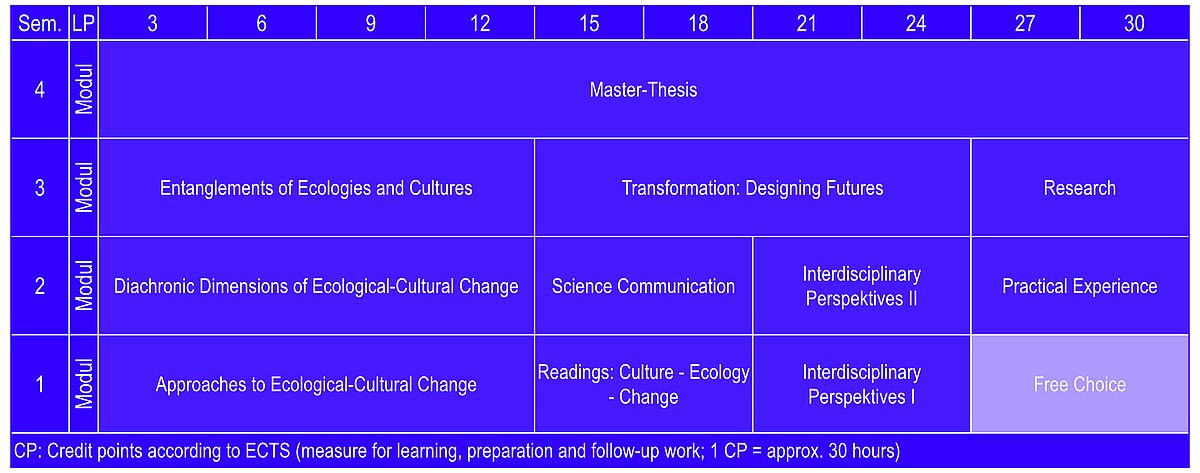Climate change, biodiversity loss, uneven development, resultant demographic pressures …
We are living in a world of multiple ecological and humanitarian crises. The M.A. programme “Culture, Ecology, Change” (CEC) provides students with the skills and resources needed to understand and actively confront the complex connections between the interconnected crises of the “Anthropocene”.
The M.A. programme “Culture, Ecology, Change” (CEC) understands and acknowledges literature, culture, and language as global agents in their own right. With a focus on environmental humanities and ecocriticism, the programme foregrounds contemporary theories and approaches to ecological and cultural change across a broad selection of (anglophone) global and historical contexts. It explicitly highlights the complex connections between climate change, migration, (post-, neo-) colonialism, uneven development and access to resources, as well as political responses to these crises. Taking global perspectives and historical roots into account, CEC enables students to grasp, and act upon, the interconnected condition of the present predicament. During their studies, students critically analyse current cultural narratives and artefacts, and practice contrasting them with alternative framings, or counter narratives – real and imaginary –to work towards understanding how narratives and counter-narratives might serve as blueprints for cultural change.
The CEC-M.A. centres on anglophone ecocriticism and environmental humanities, though it is complemented and furthered by interdisciplinary perspectives on sustainability and environmental concerns from across the University of Rostock, such as those provided by law, landscape ecology, marine ecology, agrarian and social economics, philosophy, and history. Students will be equipped with the appropriate scientific tools and skills to analyse, interpret, and shape socio-ecological processes and transformations towards a more sustainable future.
With a special focus on the Anglophone world, this interdisciplinary M.A. investigates the relationship between culture/literature and the environment. A wide variety of materials, theories, and approaches enables you to critically engage with ecologically relevant narratives and poetics and to bring them into dialogue with alternative framings – both real and imaginary. We invite you to imagine transformations toward a sustainable future.
Students should be interested in critically analysing (representations and configurations of) our current modes of production and consumption, and be eager to learn about alternatives that bear the potential to enable socio-cultural change.
The following subject-specific-admission requirements must be met for the M.A. “Culture, Ecology, Change”
- Students must hold a first professionally qualifying degree (e.g. Bachelor) in either the humanities, social science, or cultural studies with at least 180 credit points, or an equivalent degree with cultural or literary studies components amounting to 12 CP.
- Students must prove English language skills at C1 level of the Common European Framework of Reference for Languages (CEFR). (IELTS score > 7,0)
If these criteria are not met, applicants can provide further evidence of their subject and course-specific qualifications. Students may be required to attend cultural or literary studies courses in order to meet the requirements stipulated above.
“Culture, Ecology, Change” provides various perspectives on the theories, approaches, and opportunities of sustainable transformations, environmental protection, climate justice, and sustainable lifestyles, amongst other things, in particular from a humanities-driven analytical perspective.
Over the course of 2 years (4 semesters) students engage with historical roots of, diachronic perspectives of, and interdisciplinary approaches to ecological-cultural change. Students are encouraged to think creatively about the world in which they live, and consider possible sustainable solutions to current crises.
The profile of “Culture,Ecology, Change” is internationally unique. The professors at the Institute for British and American Studies have specialized in ecocritical studies, postcolonial studies and gender studies. An additional focus is on environmental and climate ethics.
Besides, Rostock University is one of the leading research facilities regarding ocean protection, marine ecology and coastal protection and adaptation – providing additional scientific knowledge that will be beneficial for this cultural studies program. CEC is currently enlarging its list of partner institutions regarding both teaching and research.
“Culture, Ecology, Change” equips students with academic and scientific skills to facilitate socio-ecological change, as well as frameworks through which you can hone practical tools to this end. You will be able to act as “agents of change” in various professional fields and local, national, and private levels. Career perspectives include, but are not limited to:
- Further Academic Qualification (PhD)
- Roles within international and non-government organisations
- Corporate social responsibility and sustainability roles
- Public relations and consulting in the fields of environmental protection and environmental science
- Roles within cultural institutions
- Higher education, Research, Teaching
The general admission requirement for a Master's degree program at the University of Rostock is a first professionally qualifying degree (usually a Bachelor's degree).
► Admission requirements for Master's degree programs at the University of Rostock
The following subject-specific admission requirements must also be met for the Culture, Ecology, Change degree program:
- First professionally qualifying degree in a humanities, social science or cultural studies subject with at least 180 credit points or another equivalent degree with cultural studies components amounting to twelve credit points
- English language skills at level C1 of the Common European Framework of Reference for Languages (CEFR)
If the above criteria are not all met, the applicant may provide further evidence of their subject and course-specific qualifications. The examination board will then decide on a case-by-case basis whether the applicant will nevertheless be admitted to the degree program.
The binding admission requirements can be found in the program-specific examination and study regulations (SPSO).
There are no admission restrictions for the Culture, Ecology, Change degree program. All prospective students who meet the admission requirements can enrol directly. Prior application is not required. The course can only be started in the first semester of the winter semester. Entry into a higher semester (e.g. for university transfer students) is possible in the winter and summer semesters
► To online enrolment for the 1st semester
Application for international students:
International prospective students apply via Uni-Assist between May 1 and July 15: www.uni-assist.de
► Culture, Ecology, Change - Bewerbung & Zulassung für Internationale Studieninteressierte
Broschures
Framework Examination Regulations (RPO)
The general rules of study in Bachelor's and Master's degree programs at the University of Rostock are determined by the
► Framework Examination Regulations (Bachelor/Master) in the currently valid version.
Specific Examination and study Regulations
The detailed rules for the study of a specific study program, are then regulated in the respective program-specific examination and study regulations (SPSO). When entering a higher subject semester, older versions of the SPSO may apply (see history).
M.A. Culture-Ecology-Change
aktuell gültig für Neuimmatrikulationen zum 1. Fachsemester:
► Neufassung (2023) → nicht amtliche englische Fassung
University of Rostock
Philosophische Fakultät (PHF)
Departmental student advisory service of the faculty
Coordinator
Adresse/Sitz:
August-Bebel-Straße 28, 18055 Rostock
Sprechzeiten nach Vereinbarung
Study Office and Examination Office
Britt Abromeit
Tel.: +49 381-498 2598
britt.abromeituni-rostockde
Adresse/Sitz: 9. Etage
August-Bebel-Str. 28
18055 Rostock
More information at the faculty website:
For general questions about studying at the University of Rostock:
Tel.: +49 381-498 1230
studiumuni-rostockde


